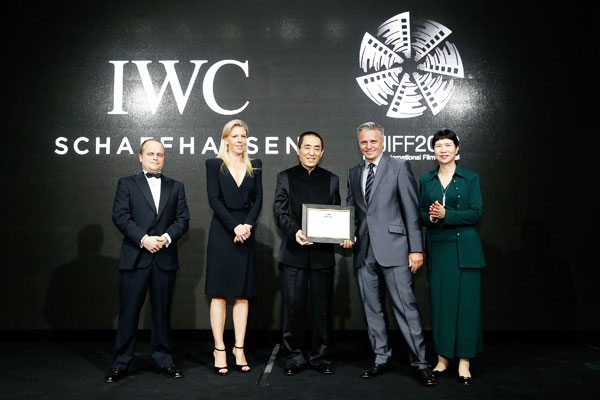Arranged marriage
Updated: 2013-05-03 01:53
By Raymond Zhou (China Daily)
|
|||||||||||
A co-production is supposed to help a film appeal to a broader international audience, but often leaves it creatively diminished and struggling at the box office.
Pauline Chan describes a co-production as a marriage that one commits to for roughly three years. Even though both sides are free to choose their partner, once a commitment is made it feels very much like "an arranged marriage".
Chan made 33 Postcards in 2011, the first official co-production between Australia, where the Hong Kong-born director is a citizen, and China. The movie is about a Chinese orphan girl who visits Sydney in search of the kind man who has been sponsoring her. It turns out he is a prisoner and never expected her to show up in his life.
 |
|
Photos provided to China Daily The Motion Picture Association of America honored director Zhang Yimou as outstanding individual for promoting Sino-US film collaboration. Provided to China Daily |
The Australian government, which provided a tax rebate, was mostly concerned with where the shooting would take place, which determines how much the production could contribute to the local economy. The Chinese government, on the other hand, scrutinized the content of the story, assessing the moral of the story and the amount of Chinese elements. In the end, it qualified for a co-production on both sides, even though much of the plotline takes place Down Under.
At a workshop organized by the Motion Picture Association of America during the third Beijing International Film Festival, Chan avoided questions about her movie's box-office performance.
A quick browse of the media landscape shows that it received largely positive reviews in China, but attracted little public awareness. Its box-office figure was so low it did not even appear in the top 10 ranking for its first week, arguably the highest for most openings.
Just as nobody likes to talk about failed marriages, nobody is willing to address in public the tension and antagonism in a co-production.
If the end justifies the means, a money-maker may well reconcile all the differences. If it turns out to be a flop, it may well become a cautionary tale, raising a huge question mark over the enterprise of co-producing a feature film.
Judging from the end results from the past decade, the rationale for co-productions is in question. Not a single movie has been a hit in both producing countries, on critical and commercial grounds.The Forbidden Kingdom grossed 188 million yuan ($30.50 million) in China and $128 million globally, making it a financial success in both countries. But the teaming up of Jackie Chan and Jet Li failed to set sparks flying as anticipated, and each of the kung fu masters had headlined much better solo performances elsewhere.
The Karate Kid raked in 47 million yuan in China and $360 million globally, making it a blockbuster in the United States but a disappointment in China. Chinese audiences admitted they had expected a much stronger movie than what they saw on screen.
Related Stories
Summit highlights film makeup, modeling 2013-04-25 21:17
Ang Lee, Kidman join Cannes Film Festival jury 2013-04-25 14:48
Film carnival kicks off 2013-04-18 19:14
Chinese films have originality: special effects artist 2013-04-18 09:55
Beijing International Film Festival closing ceremony promo 2013-04-17 18:20
Today's Top News
BBC star admits sex abuse
2012 among top 10 warmest years: report
'Iron Man 3' breaks China's box office record
China rebuts US report on religious freedom
Chinese firms 'create many jobs' in Germany
HK gold retailers swamped by mainland buyers
Funds bemoan lack of worthy projects
'Unwanted treatment' to be reduced
Hot Topics
Lunar probe , China growth forecasts, Emission rules get tougher, China seen through 'colored lens', International board,
Editor's Picks

|

|

|

|

|

|





